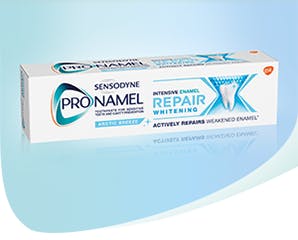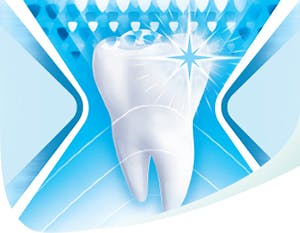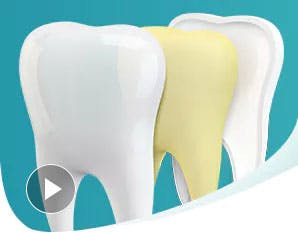
How Rinsing with Fluoride Helps Enamel
Maintaining a healthy smile starts with your oral health routine. One of the most effective ways to protect teeth and prevent tooth decay is by incorporating fluoride into your daily routine. Fluoride is a naturally occurring mineral that’s widely recognized for its ability to help strengthen tooth enamel and prevent cavities. Rinsing with a fluoride mouthwash can help fortify your tooth enamel and how you can maximize the benefits of using a fluoride mouthwash.
What Is Tooth Enamel?
Fluoride is an important part of our dental health because it strengthens our tooth enamel: the outermost layer of the tooth that protects the inner tooth from decay and damage. Although enamel is made of calcified tissue, it can still be weakened by attacks from bacterial acids. Since serious enamel damage can only be fixed by a dental professional, taking care of it should be a top priority.1
How Fluoride Strengthens Enamel
Fluoride benefits tooth enamel in a variety of ways. Fluoride strengthens enamel through remineralization—the process of depositing essential minerals back into the tooth to replenish and re-strengthen enamel. Remineralization helps fight against cavities by repairing the damage done to the outer layer of the tooth.2
Fluoride also prevents enamel damage by reducing the amount of acid on your teeth and by fortifying your teeth after acid attacks from bacteria.2,3
The Role of Fluoride Mouth Rinse
Fluoride mouth rinses and mouthwashes are an excellent way to add more fluoride to your oral hygiene routine to help make your teeth more resistant to decay.2
Rinsing with a fluoride mouthwash can help get fluoride to all areas of your mouth, including the hard-to-reach spaces between your teeth and along your gumline. In addition, studies show that your teeth absorb more fluoride when you rinse with a fluoride mouthwash vs. water alone.4
How to Use a Fluoride Mouthwash
When using a fluoride mouthwash, read the product label closely to learn how long you need to rinse. While this may go without saying, avoid swallowing any of the mouthwash. Mouthwash is not recommended for children younger than 6 years of age. They may accidentally swallow large amounts of the mouthwash, which can cause nausea, vomiting and intoxication (due to the alcohol content in some rinses). Check the label and follow specific precautions, instructions and age recommendations.3
Using a fluoride rinse for your teeth is a great way to prevent decay and strengthen enamel. Manufacturers may recommend using either before or after brushing. Most mouthwashes are recommended once a day (at bedtime) or as directed by your dentist/doctor. Every product is different so reading the label is important. Experts recommend using mouthwash at different times, such as after lunch, and then waiting 30 minutes before eating or drinking again to reap the maximum benefits.5
Additional Sources of Fluoride
Fluoride is found in a variety of sources, including toothpaste and tap water. Community water fluoridation is widely regarded as one of the most effective public health measures: studies show that populations with fluoridated water have reduced tooth decay by 40-60%.3 These results show that community fluoridated water helps protect teeth. In addition, fluoride toothpaste, when used twice daily, provides a targeted application of fluoride to the teeth, reinforcing the enamel and preventing decay.3
Fluoride plays a vital role in strengthening tooth enamel and protecting against tooth decay. Using a fluoride mouthwash to add extra fluoride to your day is an easy way to encourage strong enamel. Looking for a mouthwash designed for enamel care? Try Pronamel’s Intensive Enamel Repair mouthwash.
Source Citations:
- Tooth | MouthHealthy - Oral Health Information from the ADA. https://www.mouthhealthy.org/all-topics-a-z/tooth. Accessed 6/13/23.
- Fluoride | MouthHealthy - Oral Health Information from the ADA. https://www.mouthhealthy.org/en/all-topics-a-z/fluoride. Accessed 6/13/23.
- Fluoride - Oral Health Foundation. https://www.dentalhealth.org/fluoride. Accessed 6/13/23.
- HMU Fluorinze Mouthwash Enhances Enamel Remineralization: An In Vitro Study – PMC. https://www.ncbi.nlm.nih.gov/pmc/articles/PMC7084033/. Accessed 6/13/23.
- How to keep your teeth clean – NHS. https://www.nhs.uk/live-well/healthy-teeth-and-gums/how-to-keep-your-teeth-clean/. Accessed 6/13/23.



